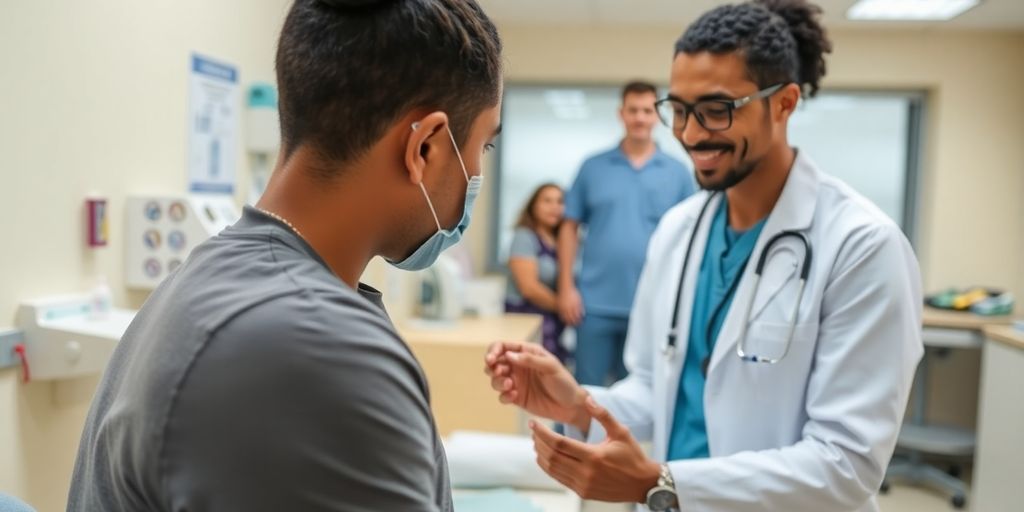Regular physicals are essential for maintaining good health. They help catch potential issues early and ensure that you stay on track with vaccinations and screenings. This guide will help you find local clinics that offer physicals and prepare for your appointment.
- Discover the Best Veg North Indian Restaurants Near Me for an Unforgettable Dining Experience
- Discover the Best Breakfast Point Near Me: Top Picks for 2024
- Finding Therapists Who Accept Cigna Near Me: Your Guide to Quality Mental Health Care
- Discover the Best Boutique Shop Near Me: A Local’s Guide to Unique Finds
- Finding Care: Who Accepts Oscar Insurance Near Me?
Key Takeaways
- Regular physicals are important for early detection of health issues.
- Using online tools can simplify finding a local clinic.
- Different types of clinics offer physicals, including urgent care and community health centers.
- Prepare for your appointment by knowing what to bring and what questions to ask.
- Understanding costs and insurance options can help you find the best care.
Understanding the Importance of Regular Physicals
Regular physicals are essential for maintaining good health. They help catch potential health issues early and ensure you stay on track with your wellness goals. Here’s why they matter:
You are viewing: Finding Where to Get a Physical Near Me: Your Guide to Local Clinics and Services
Why Regular Physicals Matter
- Early Detection: Regular checkups can identify health problems before they become serious.
- Health Monitoring: They allow you to keep track of your health over time.
- Preventive Care: Physicals often include vaccinations and screenings that can prevent diseases.
Benefits of Annual Checkups
- Get a current assessment of your health.
- Update your vaccinations.
- Review your prescriptions and medications.
Common Tests and Screenings
| Test/Screening | Purpose |
|---|---|
| Blood Pressure Check | Monitors heart health |
| Cholesterol Test | Assesses risk for heart disease |
| Blood Sugar Test | Screens for diabetes |


Regular physicals are not just about checking for illness; they are a proactive approach to maintaining your overall health and well-being.
By understanding the importance of these appointments, you can take charge of your health and make informed decisions about your care.
How to Find a Local Clinic for Physicals
Finding a local clinic for your physical can be simple if you know where to look. Here are some effective ways to get started:
Using Online Search Tools
- Search by City or Zip Code: Use online search engines or health websites to enter your city or zip code. This will help you find clinics nearby.
- Review Clinic Information: Look at the details provided for each clinic, including services offered and hours of operation.
- Check Availability: Make sure the clinic is accepting new patients and can accommodate your schedule.
Checking Clinic Reviews and Ratings
- Read Patient Reviews: Look for feedback from other patients to gauge the quality of care.
- Check Ratings: Websites often provide ratings based on patient experiences, which can help you make a decision.
- Ask for Recommendations: Talk to friends or family for their suggestions on local clinics.
Contacting Clinics Directly
- Call the Clinic: Once you have a list, call the clinics to ask about their services and availability. First impressions matter; pay attention to how the staff treats you.
- Inquire About Services: Ask specific questions like:
- Are they accepting new patients?
- What are the wait times for appointments?
- Do they offer any special services?
- Visit in Person: If possible, visit the clinic to get a feel for the environment and staff.
Finding the right clinic is essential for your health. Take your time to research and choose a place where you feel comfortable.
For example, if you need to get a school or sports physical right away, you can book an appointment at CVS MinuteClinic at 6748 W 111th St, Worth, IL 60482. This can be a convenient option for quick service.
Types of Clinics Offering Physicals
When it comes to getting a yearly wellness physical, there are several types of clinics you can choose from. Each type offers different services and benefits, making it important to find the right fit for your needs.
Primary Care Providers
- Regular checkups: These doctors focus on your overall health and can provide annual physicals.
- Long-term relationship: They get to know your medical history and can offer personalized care.
- Preventive care: They often recommend screenings and tests to catch issues early.
Urgent Care Centers
- Convenient access: Great for quick visits when you need a physical but can’t wait for an appointment.
- Extended hours: Many are open evenings and weekends, making it easier to fit into your schedule.
- Walk-in services: No need for an appointment, which is helpful for last-minute needs.
Community Health Clinics
- Affordable options: These clinics often provide services on a sliding scale based on income.
- Focus on underserved populations: They aim to help those who may not have access to regular healthcare.
- Comprehensive services: Many offer additional services like dental and mental health care.
Finding the right clinic for your physical can make a big difference in your health journey. Consider your needs and choose a clinic that fits your lifestyle and budget.
Preparing for Your Physical Appointment
Getting ready for your physical appointment is important to ensure everything goes smoothly. Here are some key steps to follow:
What to Bring to Your Appointment
- Identification: Bring a valid ID, like a driver’s license.
- Insurance Information: Have your insurance card handy.
- Medical Records: Gather any relevant medical history or records.
Questions to Ask Your Doctor
Before your appointment, think about what you want to know. Here are some questions you might consider:
- What tests will I need?
- How often should I have physicals?
- Are there any lifestyle changes I should make?
Understanding Your Medical History
Read More : Who Pays the Most for Catalytic Converters Near Me? Discover the Best Buyers!
It’s helpful to know your medical history. This includes:
- Past illnesses or surgeries
- Family health issues
- Current medications you are taking
Being prepared can help you get the most out of your visit. Take time to gather your information and think about your health goals.
By following these steps, you can ensure that your physical appointment is productive and informative. Remember, your health is important, and being prepared is a key part of that process!
Cost and Insurance Considerations
Understanding Insurance Coverage
When planning for a physical, it’s crucial to know how your insurance coverage works. Most health plans cover preventive care, including physicals, at no extra cost if you see a network doctor. Here are some key points to consider:
- Check if your doctor is in your plan’s network.
- Understand your plan’s specific coverage details.
- Look for any copayments or deductibles that may apply.
Options for Uninsured Patients
If you don’t have insurance, don’t worry! Many clinics offer services on a sliding scale based on your income. Here are some options:
- Community health clinics often provide low-cost services.
- Some urgent care centers may have affordable rates for physicals.
- Look for local health fairs that offer free or low-cost checkups.
Comparing Costs Between Clinics
It’s wise to compare prices between different clinics. Here’s a simple table to help you:
| Clinic Type | Average Cost | Insurance Accepted |
|---|---|---|
| Primary Care Provider | $100 | Most major insurers |
| Urgent Care Center | $75 | Limited insurers |
| Community Health Clinic | $50 | Sliding scale |
Remember: Always ask about costs upfront to avoid surprises later.
Understanding these factors can help you make informed decisions about your health care. Finding the right clinic can save you money and ensure you get the care you need.
Additional Services Offered at Clinics
Preventive Care Services
Many clinics provide preventive care services to help you stay healthy. These services can include:
- Vaccinations
- Health screenings
- Counseling on healthy lifestyles
Specialized Health Screenings
Clinics often offer specialized screenings to catch health issues early. Some common screenings include:
- Blood pressure checks
- Cholesterol tests
- Diabetes screenings
Telehealth and Virtual Visits
With the rise of technology, many clinics now offer telehealth services. This allows you to:
- Consult with doctors from home
- Get prescriptions without visiting the clinic
- Access care during off-hours
Many clinics, like Harris County Public Health, provide a variety of low-cost, clinical and preventive health services to meet your essential healthcare needs.
Read More : Discover the Best Lunch Restaurants Near Me for an Unforgettable Dining Experience
These additional services can enhance your overall health experience and ensure you receive comprehensive care.
Tips for Choosing the Right Clinic
Location and Accessibility
- Choose a clinic that is close to your home or workplace. This makes it easier to attend appointments.
- Check if the clinic has parking available or is near public transportation.
- Consider the clinic’s hours. Are they open when you need them?
Clinic Hours and Availability
- Look for clinics that offer flexible hours, including evenings and weekends.
- Ask about appointment availability. How long will you have to wait for an appointment?
- Inquire if they accept walk-ins for urgent needs.
Patient-Doctor Communication
- Schedule a visit to meet the doctor before your appointment. This helps you feel comfortable.
- Pay attention to how the staff treats you. Are they friendly and helpful?
- Ask questions about your health and see if the doctor listens and responds well.
Finding the right clinic is important for your health. A good relationship with your doctor can lead to better care and support.
Summary Table of Considerations
| Factor | Importance |
|---|---|
| Location | Easy access to appointments |
| Hours of Operation | Flexibility for your schedule |
| Communication Style | Comfort in discussing health issues |
Final Thoughts
Choosing the right clinic can make a big difference in your healthcare experience. Take your time to research and find a place where you feel valued and cared for. Look for clinics with good reviews and check their certifications to ensure quality care.
Final Thoughts on Finding Local Clinics
In conclusion, finding a nearby clinic for your health needs doesn’t have to be hard. By using simple tools like online searches and asking friends for advice, you can discover great options. Remember to check if the clinic accepts your insurance and if they have the services you need. Don’t hesitate to call and ask questions to make sure you feel comfortable. Your health is important, and having the right care can make a big difference. So take your time, do your research, and find a clinic that feels right for you.
Frequently Asked Questions
Why should I get a physical every year?
Regular physicals help catch health issues early, making it easier to treat them.
What should I expect during a physical exam?
During a physical, the doctor will check your height, weight, blood pressure, and may do blood tests.
How can I find a clinic near me?
You can search online using your city or zip code, or ask friends for recommendations.
What if I don’t have insurance?
Many clinics offer services at low or no cost for those without insurance.
Can I talk to my doctor outside of appointments?
Yes, many doctors allow you to message them through their clinic’s online system.
What other services do clinics offer besides physicals?
Clinics may provide preventive care, health screenings, and even virtual visits.
Soure: https://herego.net
Category: near me


